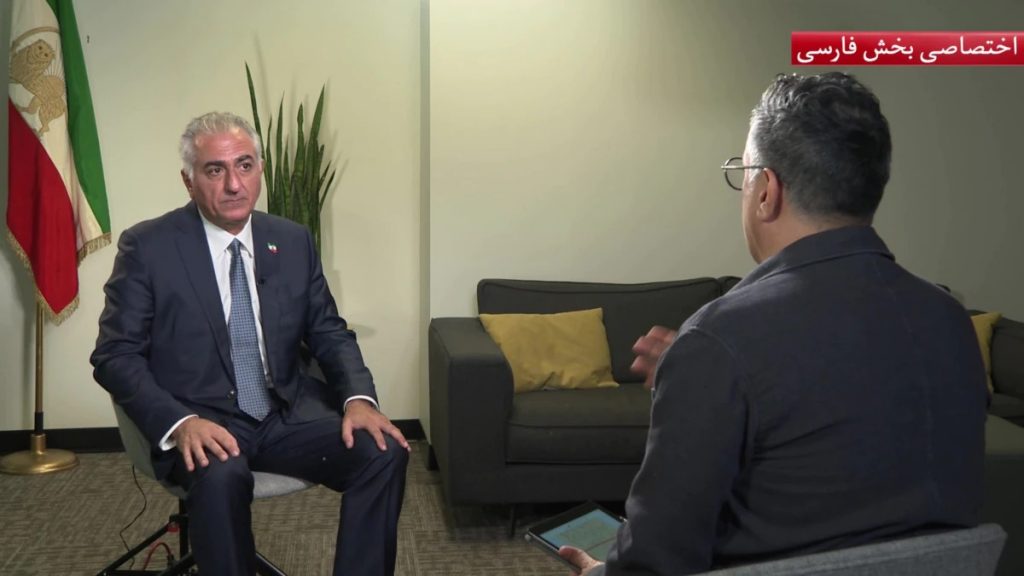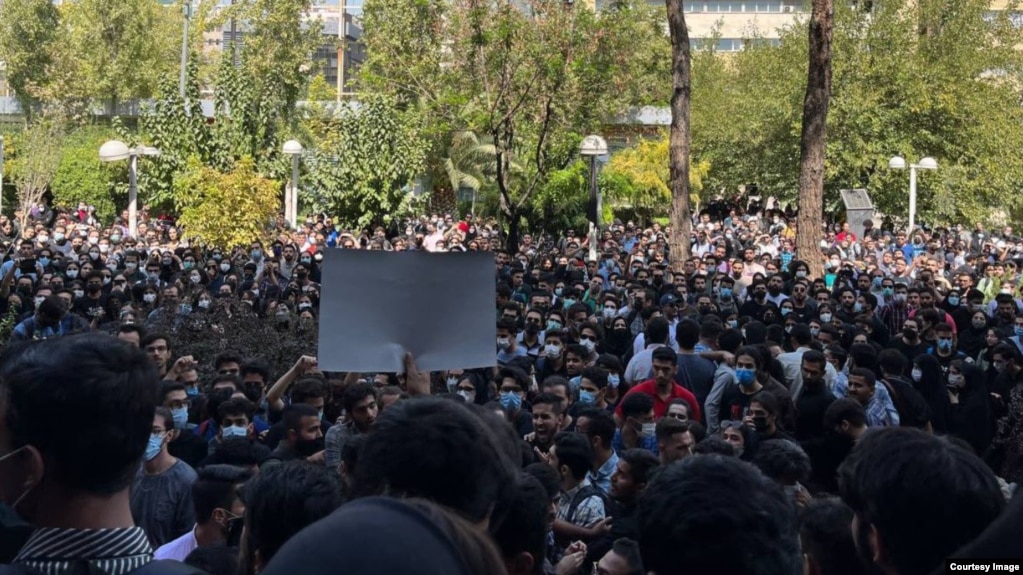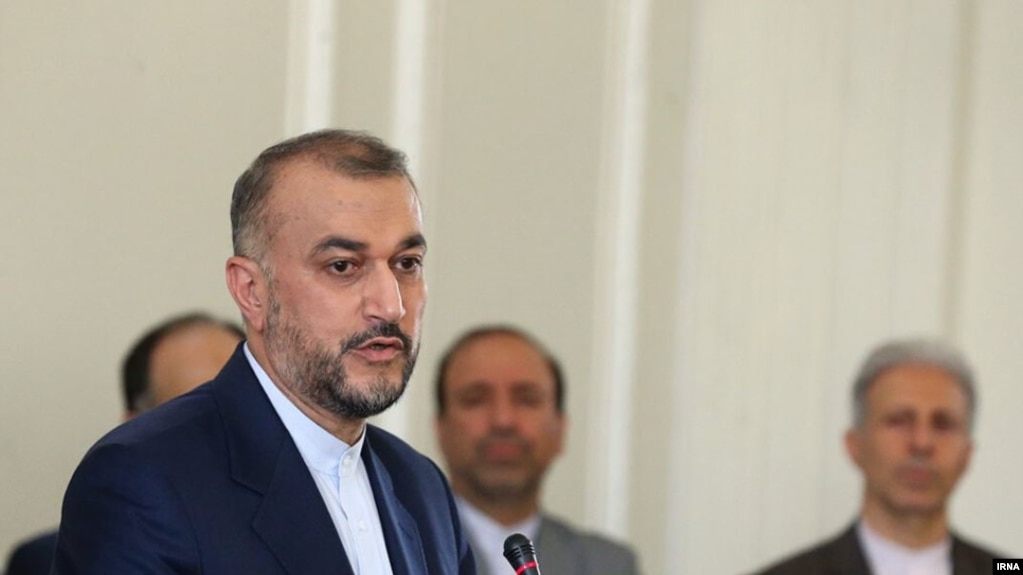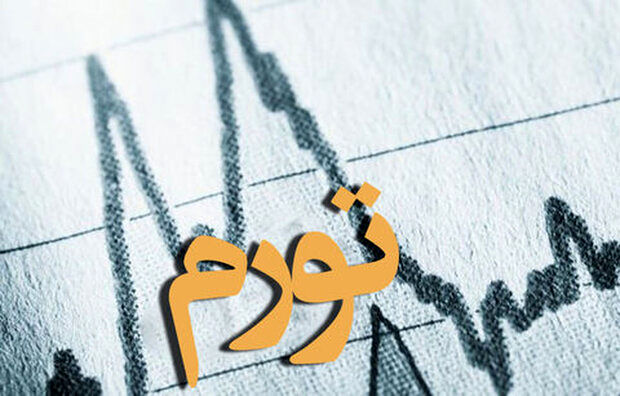
Where Are We Going?
The editorial of Arman Melli, written by “reformist” academic Sadegh Zibakalam, focuses on the ongoing protests and unrest in Iran, underscoring that the Iranian authorities must not ignore the deep dissatisfaction which exists in the country. After Mahsa Amini, a 22-year old woman, was murdered by the so-called morality police, the Iranian people have taken to the streets in protest, clashing with security and law enforcement forces mostly after sunset.
All Iranians are worried about the current situation in the country. Whether they are supporters or critics of the government, they are concerned about the future of the country. All Iranians, both inside and outside the country, keep asking each other about what is going to happen in Iran. Millions of Iranians, once again both inside and outside the country, are waiting to see if more protests will be held again when the sun sets.
So far, there has not been much difference in the way the government has confronted the protesters. The same violent manner of confrontation continues unabated. If only more moderate political figures in Iran like Nategh Noori, Ali Larijani, Bahonar and Ahmad Tavakoli could have more influence on the current crisis!
Nothing is worse than what some authorities want to do by pretending that there is no problem. They do not want to admit that women and the youth are not in agreement with their plans. If it were not for Amini, people would have found another excuse, and there would be other waves of unrest.
The country’s authorities will probably not think of any fundamental solution to these problems in the long run, and this crisis too might be over. Next week, the waves of protests and unrest might subside, the detainees might be released, and the country might go back to where it was before Amini was killed.
But the authorities must pay attention to the message of these protesters: that Iranian society is dissatisfied, and the authorities are only evading the facts by ignoring this dissatisfaction and blaming others for what is happening in the country.
Fighting Battles Which We Might Win
The editorial of Jahan Sanat argues that to make achieve economic prosperity in Iran, it is necessary for the government to stop fighting the West and to connect the country to the global economy.
Ebrahim Raisi’s government insists on saying that they have had brilliant achievements during its first year of taking office, and “hardline” media outlets have put pressure on independent media outlets for not praising the government’s achievements. Unlike what the government claims, businesses, companies and even the government have not experienced any meaningful changes in the past year, while the country’s foreign policy continues to falter and society continues to decline.
The Iranian economy, under the current circumstances, is suffering from US sanctions, while the government has put heavy pressure on citizens to pay taxes. In the meantime, inefficient monetary, banking, currency and trade policies are still in place.
The government’s miserable situation reveals itself in its budget deficit which has resulted in eliminating subsidies on food items. As a result of these pressures, families’ purchasing power has shrunk. This has put pressure on companies as they cannot sell their products to people who have lost their purchasing power.
Now the citizens’ question for the country’s economic and political officials is: what is their plan for saving Iranian businesses from this terrible situation? The truth is that within Iran, there are not enough financial resources to save the country’s economy.
Experience shows that the solution is not transferring money from one market to another or from one industry to another – something which the oil minister has promised to do.
Iran’s economy must have access to international resources, but connecting with the global economy has its own requirements, one of which is stopping the fight against the West. The Iranian authorities must know that fighting the West will not be successful given Iran’s current economic capabilities. In so far as the fight goes on, we should not expect any economic miracles.
Bitter Facts About the Economy
The editorial of Servat highlights some painful facts about the economy and living standards in Iran, concluding that the government cannot solve these problems because of its own huge expenses.
Facts must not be ignored. Last year, the price of oil increased by 370 percent, meat 61 percent, eggs 120 percent, cheese 135 percent, and dairy products 100 percent. Other food items’ prices too have gone up not less than 100 percent. Meanwhile, pensioners’ salaries have only increased by 38 percent. Now the crucial question is: how should people provide for their basic needs?
Iranian presidents, at the time of their election, make promises to their supporters, pledging that they will not give up on people’s demands. People keep waiting and hoping for these promises to come true. Posing as saviors, these presidents spend the early years of their presidency complaining about the disasters created by their predecessors, while asking people to be patient so that they can fix the ruins they have inherited.
After a while, the presidents start talking about the obstacles ahead of them. People who first thought of these presidents as their saviors now start losing hope in them. Now, the disillusioned public become nostalgic about previous presidents, calling the current one the root cause of all problems!
One of the main reasons is that in Iran, no one believes in preventive measures, which requires transparency and accountability. No one believes in these principles, so no preventive measures can be taken.
Ebrahim Raisi’s government started its term in a much worse position than previous governments. In the meantime, people are in pain, depleting their savings just to stay alive. The huge increase in the price of housing and the difficulty in meeting basic needs has made life very hard for people, and strangely enough, no one is even talking to the people about this.
With more than 70 percent of people below the poverty line and with more than 12 million people living in slums, one cannot hope that the government can solve all these problems at once, as the government itself has grown so big that it cannot provide for its expenses.
The Public Will Not Tolerate the Disregard of Its Demands
The editorial of Shargh, penned by Tabriz MP Ahmad Alireza Beigi, urges that people’s demands regarding women’s hijab must be prioritized. Recently, Mahsa Amini was murdered while in the custody of the so-called morality police in Tehran which has triggered widespread protests against forced hijab all over the country.
The bitter incident, which happened during the confrontation of the morality police with Amini, is a warning signal that the way the establishment has countered the issue of hijab or improper hijab is basically wrong and people have paid a very high price for this.
Even though a high price has been paid in this regard, it is incomprehensible why the government insists on pursuing the same process. It must be emphasized that the 2 hour class -– which is held for people with improper hijab – is not going to change them. If they change their minds after participating in such short classes, then we should have doubted their sanity. A huge budget is spent on the issue of promoting the hijab, but to no avail. And the morality police expect to change women’s minds in just 2hours!
The other issue is that the morality police insist on taking youths’ national identity cards which makes them feel uneasy about the future.
So, it must be underscored that the method of the morality police is wrong and should not continue.
Now, given what has happened, people expect a parliamentary response to this issue. It must be stressed that people’s demands should not be ignored. In Ebrahim Raisi’s government, there is this view that people’s votes are not needed, holding that when the time comes for the next presidential election, people will have to vote for Raisi.
But they must know that no such thing is true. If priority is given to the people, their demands must matter. If Iranian officials and authorities do not change their path, people will question the legitimacy of the theocratic political system in Iran.

Reza Pahlavi: People in Iran Know What They Want, Do Not Need a Leader

As widespread protests over the death of a young Kurdish woman, Mahsa Amini, continue in many cities, Reza Pahlavi said regarding the presence of youths that “this regime has never had national interests in mind and this generation, having learned the lessons of the past 40 years, sees the horizon ahead very well and knows what it wants.”
As for speeding up the process of attaining freedom in Iran, Reza Pahlavi said that all individuals and influential figures, parties and organizations must try hard to support people’s struggle and the protests and strikes so that the Iranian government completely collapses.
Reza Pahlavi asserted with regard to leadership of the protests that “I do believe in people in Iran and they know what they are doing and what they want. They don’t need leadership now but need support and encouragement for continuing their presence on the scene.”
He underlined the necessity of increasing international talks, adding that leaders of other countries must know what is going on in Iran so that these governments are aligned with the Iranian people and distance themselves from the Iranian government.
Reza Pahlavi also said that while in the past 40 years the revolutionary requisites have never materialized, “now we are actually in the middle of a revolution.”
Underscoring the importance of crippling the driving forces of the Iranian political system, he emphasized on launching strikes, urging that “the initiatives are undertaken inside the country and those of us living abroad will support and back the people and these movements.”
Reza Pahlavi added that not only the Iranian people, but the entire world has suffered due to the Iranian political system, and by eliminating this system, many problems in the world like terrorism, seeking asylum, nuclear threats and the energy crisis will be immediately and decisively resolved.
Reza Pahlavi concluded that “the regime and the people have reached the point of no return, and we all must help and mobilize forces to take utmost advantage of this situation.”
Widespread Strike of Iranian Students in Protest Against Detentions, Online Classes

As widespread protests over the murder of Mahsa Amini by the so-called morality police continue, many Iranian university students have refused to attend classes in protest against the repressive security measures endured by students, the detention of protesting students, and also the holding of online classes.
These universities include the University of Science and Culture, Kharazmi University, Sharif University of Technology, Allameh Tabatab’i University, Tehran University, Soore University, Art University, Nasir al-Din al-Tusi University, Alzahra University, the University of Social Welfare and Rehabilitation Sciences, Chamran University in Tehran, Sahand University in Tabriz, Noshiravani University of Technology in Babol, and other universities.
In recent days and nights, a large number of university students have been arrested by security forces in assemblies, dormitories, and even in their houses.
To stop students from attending classes in person, the government has announced that classes will be held online, an act which is considered “insulting” by students.
Iranian students have also asked university professors and staff to join the strikes and peaceful protests and cancel classes and officially announce their positions.
In recent days and after the death of 22-year-old Amini, students from universities of Tehran and other cities of Iran have held many gatherings and many students have been arrested. But the exact number of detained students and their identities are not clear yet.
While Iranian university students have announced a strike, the Coordinating Council of Teachers Formations issued a statement in protest against the widespread crackdown on popular protests and the arrest of students and protesters, asking Iranian teachers and students to refuse to go to classes on Monday and Wednesday.
Many university professors have already refused to attend classes and joined the students, while a number of them have resigned.
Iranian Foreign Minister Claims Receiving America’s “New Message” Regarding JCPOA

Two months after the last meeting in Vienna about the possible agreement for reviving the nuclear deal (JCPOA), Iranian Foreign Minister Hossein Amir-Abdollahian alleged that Tehran received a new message from the Americans which emphasizes “[their] having resolve and good intentions for reaching an agreement.”
According to IRNA news agency, Abdollahian claimed to have responded to the Americans’ message telling them to “show and prove your resolve, and good intentions so that we can reach an agreement.
US officials have not confirmed the Iranian foreign minister’s claims as to sending a message to Raisi’s government regarding the JCPOA, and Abdollahian has not given any explanation about how and on what level this message has been delivered to Iran.
Meanwhile, the Iranian foreign minister who is still in New York for the UN General Assembly has asserted that he and his team have held talks with representatives from the EU and other countries related to the nuclear talks. He did not reveal the details of the talks.
In the meantime, the head of the Iranian Parliament’s National Security and Foreign Policy Commission Vahid Jalalzadeh, who had accompanied Ebrahim Raisi on his trip to New York, alleged that the US president, through his Swiss counterpart, demanded to meet with the Iranian president in New York.
According to Jalalzadeh, the Swiss president was “carrying America’s message for a bilateral meeting,” but Raisi replied to him, “Have we ever benefitted from previous bilateral meetings?”
The US administration underscored in recent days that Iran’s response to the latest proposal for reviving the JCPOA has been frustrating.
Josep Borrell, representative of the EU for foreign affairs, recently warned the Iranian government that there would be no agreement better than the one already proposed, urging that Iran had better agree with and finalize it.
Journalist Abbas Abdi recently underscored that according to reliable sources, Iranian President Ebrahim Raisi has been entrusted with making the final decision on reviving the JCPOA.
42 Percent Inflation in Iran Last Month

Skyrocketing prices are a continuing feature of life in Iran, with the annual rate of inflation over 42 percent last month.
The Statistical Center of Iran released prices indexes for last month, in which the annual rate of inflation was 42.1 percent, while the month before that, the inflation rate was at 41.5 percent.
Since 2019, the rate of inflation has been persistently more than 30 percent.
Iranian President Ebrahim Raisi took power making a pledge to bring down the inflation rate to a single digit and uproot absolute poverty by 2022. But one year after taking office, his slogans about inflation and poverty – like his other promise to build 1 million residential units per year – have not been fulfilled, while no one in his government is held accountable.
According to the Statistical Center’s report, the inflation rate in rural areas has been higher than in urban areas in Iran, with urban and rural inflation rates being 41.5 percent and 45.3 percent respectively.
The point-by-point inflation rate for food items, beverages and tobacco has been reportedly 75.4. percent, which means that, on average, Iranians have paid much more on prices of similar food items and beverages compared to last year.
Most price increases for food items have been related to red meat and poultry products. According to the latest report of the World Bank on food security in different countries, after Lebanon, Zimbabwe and Sri Lanka, Iran has the highest inflation rate.
Iran’s national currency has greatly lost its value against other currencies in the world.
According to Donya-e Eghtesad daily, given the continuation of the stalemate in the nuclear talks and the eruption of protests in cities across Iran, those involved in the currency market are buying and selling forex more cautiously.
